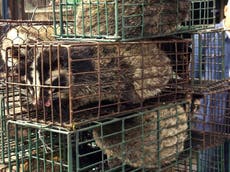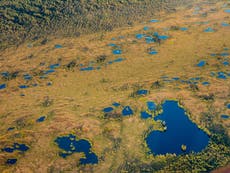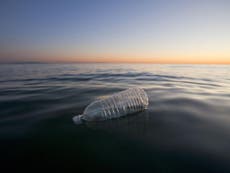We are on the verge of a sixth mass extinction. That's why a natural history GCSE is so important
As the American author Richard Louv writes: We won’t protect what we don’t love and we won’t love what we don’t know – and so many children today don’t know

This week we take a step closer to a cause which has been close to my heart for the past three years: a new GCSE in natural history. The consultation process is now open, launched by the exam board OCR, which is backing the new subject. It feels long overdue.
The most recent State of Nature report showed nearly half of all species in Britain are in decline. In the past decade alone, we’ve lost a quarter of our hedgehogs and 30 per cent of my favourite bird, the swift. Species vital to our survival, like the bee, are in catastrophic decline.
The scale of the destruction of our wildlife is terrifying – and it’s accelerating. Only this week, scientists warned that the sixth mass extinction of life on Earth is happening faster than ever and bringing with it the real risk of a collapse of civilisation.
A new GCSE in natural history, first proposed by the writer and naturalist Mary Colwell in 2011, is not going to turn around this catastrophe, but it’s a start. As the American author Richard Louv has written: We won’t protect what we don’t love and we won’t love what we don’t know.
And so many children today don’t know. A survey in 2018 found that more than half of UK children are unable to identify a stinging nettle. Earlier research showed nearly 10 per cent hadn’t visited a park, forest or beach for 12 months or more. With half of all species in the UK in moderate or serious decline, there is a real danger that the next generation will grow up unable to recognise the wildlife on our doorsteps until it has gone.
It has taken nearly a decade to come this far, but this may be the right moment to bring natural history to the school curriculum.
First, the coronavirus crisis has brought home to us the importance of green spaces for our physical and mental health and wellbeing. It has also brought warnings from scientists of the link between the spread of pandemics and the destruction of nature, which has created a “perfect storm” where pandemics will flourish.
Secondly, there is huge awareness of the climate and nature crises among children and young people who have been at the forefront of campaigning with the school climate strikes. The interest is there, and the chance to study natural history will give them a deeper understanding of the natural world and our impact on it.
I believe many of them will grab this chance and I hope teachers will be equally enthusiastic about teaching it.
A natural history GCSE is not an offshoot of biology with a bit of geography attached. To the contrary, it will cover intensive field study of whole organisms in their habitat, identification of species, classification and recording processes. It will also place British natural history in a global context through the study of migratory species. It complements biology and geography – it doesn’t replace them.
The early feedback from teachers has been full of enthusiasm. One biology teacher got in touch to say: “In my experience, students are woefully unaware of the natural work and I’d be thrilled to help however I can.”
It is different too, because this GCSE is not just desk-based learning. The OCR examination board has developed a course focused on field study, but also includes an exploration of our relationship with nature and how it has shaped art, literature and music. It will foster a scientific, practical and emotional connection to the natural world and thus provide a unique contribution to the GCSE offerings.
Nor do I believe that this will be an elitist subject for pupils in rural schools. Interest has been across the board, both from schools in remote rural areas and inner cities as well as from different cultural backgrounds. Studying natural history is not about a sentimental preoccupation with a bucolic past; it’s about engaging with the realities of an environment under intense pressure, how different species are responding and how nature plays out in urban settings.
Our school curriculum has always evolved to respond to the world as it is now. When I was at school, geography classes were about glaciation or the location of Britain’s coalfields. Now they are more likely to cover climate change and migration.
When the natural world on which we depend is facing such catastrophic loss, it is vital that we give children the tools to understand what is happening so we can act, before it’s too late.
Caroline Lucas is the Green Party MP for Brighton Pavilion






Join our commenting forum
Join thought-provoking conversations, follow other Independent readers and see their replies